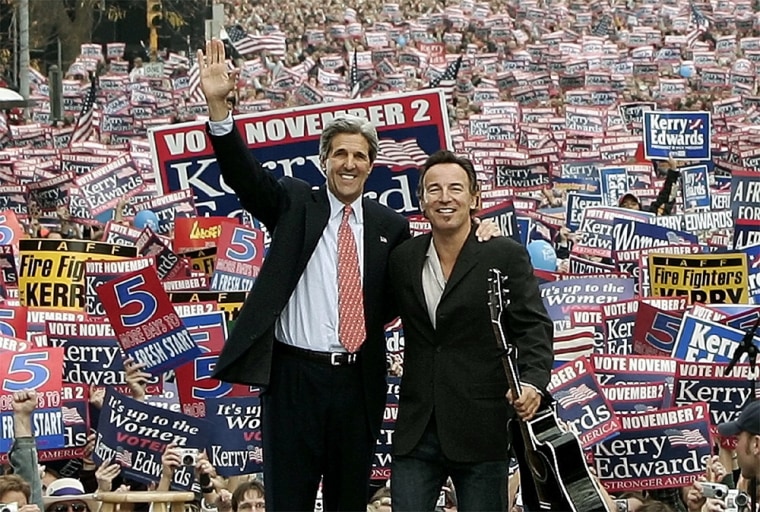Whose late-inning strategy is going to work? That's the crucial question as we head into the last few days of this nasty, nervous and narrowly divided election. It's so close that two fateful decisions, one by each campaign, could decide the outcome next Tuesday. The first: George Bush's decision to leave Ohio and go prospecting in the Upper Midwest. The second: John Kerry's decision to spend at least five days talking about a munitions dump in Iraq.
Earlier this month, for reasons that are in dispute, Bush essentially left Ohio uncovered as he went searching for votes in the Blue States of the Upper Midwest. He was gone from the Buckeye State for 20 days. Did Karl Rove send the president away because he was confident of the GOP base in Ohio? (That's what they claim at BC04). Or was it because he knew that Bush was in trouble there, especially after the Treasury Secretary told Ohioans that job-loss numbers were a "myth?"
I tend to buy the Democrats' theory, but, either way, it was a huge gamble: As every amateur pundit knows (even me), no Republican has ever won the White House without winning Ohio. But one admiring Democratic strategist says that Bush-Rove were smart enough to have found a "workaround" for their Ohio problem — namely focusing candidate time and ad money on Wisconsin, Iowa and even Minnesota, and making more forays into Michigan. "It was a strategy I think was born of necessity but it was smart," said this Democrat. "At the very least, Kerry has had to defend Blue turf."

Defend it he is, of course — most recently joining up with Bruce Springsteen so that the Boss could sing "No Surrender" to the Cheeseheads.
In this theory, there are only four states that matter now: Florida — of course, and always — plus Ohio, Iowa and Wisconsin. The Bush hope is to substitute Iowa and Wisconsin's 17 Electoral Votes for the 20 the GOP may lose in Ohio. But Bush needs both Iowa and Wisconsin, and he will then be spending much of the end of the campaign back in Ohio — where it may or may not be too late, given concerns about the economy there.
Which leads me to the other gamble, this one by Kerry: to stop even trying to make news on the economy, or to sell himself in any way, and focus on news accounts of the lost explosives in a munitions dump in Iraq in the spring of 2003. This plays to the theory that the story is emblematic of the Bush administration's lack of planning and competence in prosecuting the war in Iraq and, in turn, a sign that the president has failed as commander-in-chief.
Last Monday in Philadelphia, Kerry sat down with Bill Clinton in a holding room before a big rally there, then came out swinging on the story of the day — the now-infamous Al-Qaqaa site. The huge throng of some 80,000 loved it, cheering wildly at every new attack on the president's handling of the war.
When Bush and the White House didn't respond, Kerry kept attacking, keeping a relentless focus on the war in Iraq. I had been told by his aides that he would spend much of the final days trying to reassure voters about his own character and plans for the country. But Kerry himself clearly preferred the Al-Qaqaa attacks, which follow the strategic doctrine he has employed since the convention: Go after Bush's perceived strength, and try to separate the war in Iraq (which Americans increasingly don't like) from the "war on terrorism" broadly defined.
What I wonder is whether, in the end, it will have been wise for Kerry to have spent so much time on this. Maybe so, for the story does demonstrate (whenever the explosives were spirited out of the site) that the Bush team had no real plan for immediately finding and securing munitions there.
On the other hand, the existence of such dumps — and many more like them — underscore Bush's point about why Saddam Hussein was such a dangerous character. And 40 percent of the American people, according to recent polls, still think Saddam was involved in 9/11.
The frightening new terrorist tape released Thursday will give the president a chance to argue, once again, that his Doctrine of Pre-emptive War is the only wise one to pursue when faced by threats such as the one Americans will see on their television screens. That will be Bush's pitch when he returns to Ohio this weekend — and I can assure you that, in Ohio at least, he'd rather talk about terrorism and even the ammo dumps in Iraq than jobs in Canton.
